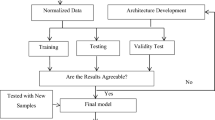Abstract
The rise of health care cost is one of the world’s most important problems. Disease prediction is also a vibrant research area. Researchers have approached this problem using various techniques such as support vector machine, artificial neural network, etc. This study typically exploits the immune system’s characteristics of learning and memory to solve the problem of liver disease diagnosis. The proposed system applies a combination of two methods of artificial immune and genetic algorithm to diagnose the liver disease. The system architecture is based on artificial immune system. The learning procedure of system adopts genetic algorithm to interfere the evolution of antibody population. The experiments use two benchmark datasets in our study, which are acquired from the famous UCI machine learning repository. The obtained diagnosis accuracies are very promising with regard to the other diagnosis system in the literatures. These results suggest that this system may be a useful automatic diagnosis tool for liver disease.




Similar content being viewed by others
Explore related subjects
Discover the latest articles, news and stories from top researchers in related subjects.References
Chikh, M. A., Saidi, M., and Settouti, N., Diagnosis of diabetes diseases using an Artificial Immune Recognition System2 (AIRS2) with fuzzy K-nearest neighbor J. Med. Syst. 36(5):2721–2729, 2012.
El-Rashidy, M. A., Taha, T. E., and Ayad, N. M., An effective intelligent model for finding an optimal number of different pathological types of diseases. Int. J. Comput. Appl. Technol. 35(1):21–29, 2011.
Giveki, Davar, Hamid Salimi, GholamReza Bahmanyar, and Younes Khademian., Automatic detection of diabetes diagnosis using feature weighted support vector machines based on mutual information and modified cuckoo search. http://arxiv.org/abs/1201.2173, 2012.
Neshat, M., Mehdi, S., Adel Nadjaran, T., and Azra, M., Hepatitis disease diagnosis using hybrid case based reasoning and particle swarm optimization. ISRN Artif. Intell. 12(3):1–6, 2012.
Karthik, S., Priyadarishini, A., Anuradha, J., and Tripathy, B. K., Classification and rule extraction using rough set for diagnosis of liver disease and its types. Adv. Appl. Sci. Res. 2(3):334–345, 2011.
Ekong, V. E., Onibere, E. A., and Imianvan, A. A., Fuzzy cluster means system for the diagnosis of liver diseases. Int. J. Comput. Sci. Technol. 2(3):205–209, 2011.
Lin, R.-H., An intelligent model for liver disease diagnosis. Artif. Intell. Med. 47(1):53–62, 2009.
Onisko, Agnieszka, Marek J. Druzdzel, and Hanna Wasyluk. A Bayesian network model for diagnosis of liver disorders. In: Proceedings of the Eleventh Conference on Biocybernetics and Biomedical Engineering( CBMI ), pp. 842–846, Pittsburgh, 1999.
Jock A. Blackard. UCI Repository of machine learning databases. http://archive.ics.uci.edu/ml/datasets/ ILPD, 2012.
Ramana, Bendi, V., Surendra Prasad Babu, M., and Venkateswarlu, N. B., A critical comparative study of liver patients from USA and INDIA: An Exploratory Analysis. Int. J. Comp. Sc. Issues 9(3):506–516, 2012.
Bendi Venkata, R., Surendra Prasad, B., and Venkateswarlu, N. B., A critical evaluation of Bayesian classifier for liver diagnosis using bagging and boosting methods. Int. J. Eng. Sci. Technol. 4(3):3422–3426, 2011.
Jock A., Blackard. UCI Repository of machine learning databases. http://archive.ics.uci.edu/ml/datasets/Liver+Disorders, 1990.
Garcke, Jochen, and Michael Griebel., Data mining with sparse grids using simplicial basis functions. In: Proceedings of the seventh ACM SIGKDD international conference on Knowledge discovery and data mining(KDD-2001), pp. 87–96. San Francisco, 2001.
Dorneniconi, C., Peng, J., and Gunopulos, D., An adaptive metric machine for pattern classification. Adv. Neural Inf. Process. Syst. 13(13):458–465, 2001.
Llora, X., Goldberg, D., Traus, I., and Bernado, E., Accuracy, parsimony, and generality in evolutionary learning systems via multiobjective selection. Learn. Class. Syst. 2003(2):118–142, 2003.
Acknowledgements
This work was supported by the National Natural Science Foundation of China under Grant No. 61100150, Natural Science Foundation of Guangdong Province of China under Grant No. S2011040004528, No.S2011040004121 and No.S2011040004121.
Author information
Authors and Affiliations
Corresponding author
Rights and permissions
About this article
Cite this article
Liang, C., Peng, L. An Automated Diagnosis System of Liver Disease using Artificial Immune and Genetic Algorithms. J Med Syst 37, 9932 (2013). https://doi.org/10.1007/s10916-013-9932-9
Received:
Accepted:
Published:
DOI: https://doi.org/10.1007/s10916-013-9932-9




